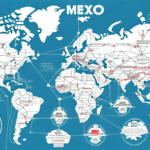Introduction to E-Commerce Shipping Restrictions
In today's digital age, e-commerce businesses are experiencing unprecedented growth and expanding their global reach. However, with this expansion comes the challenge of navigating the complex world of logistics, particularly shipping restrictions. This article provides an in-depth understanding of shipping restrictions in e-commerce logistics, detailing how to identify, comply with, avoid, and overcome them to ensure smooth deliveries and prevent costly penalties.
Understanding Shipping Restrictions in E-Commerce
Shipping restrictions are rules and regulations that govern the transportation of goods and products across different geographical regions or countries. These restrictions vary depending on the type of product, the destination, and the mode of transportation used.
For instance, certain products may be prohibited from shipping due to their hazardous nature, while others may require additional permits or certifications before transportation. Non-compliance with these restrictions can lead to severe legal consequences, including the seizure or destruction of products and substantial monetary penalties.
It is crucial for e-commerce businesses to stay informed about shipping restrictions to avoid legal issues and ensure the safe and efficient delivery of their products. This involves researching specific regulations in different regions and countries and partnering with experienced logistics providers who can navigate these complexities.
Additionally, e-commerce businesses may need to explore alternative shipping methods or adjust their product offerings to comply with shipping restrictions. This could involve sourcing products from suppliers who meet necessary requirements or targeting markets with fewer shipping constraints.
Common Types of Shipping Restrictions
E-commerce businesses often encounter various shipping restrictions, including:
- Prohibitions on the transportation of hazardous goods, such as chemicals, explosives, and flammable materials
- Restrictions on the transportation of live animals or organic products
- Requirements for permits or certifications when transporting medical equipment or pharmaceuticals
- Limits on the quantity or value of goods that can be transported to individual countries
Another common restriction involves the transportation of specific food items. Many countries impose strict regulations on importing food products, especially perishables or those containing certain ingredients. Compliance with these regulations is essential to avoid legal issues or shipping delays.
Furthermore, some nations restrict the import of certain types of technology or electronics. For example, devices utilizing encryption technology or GPS capabilities may be prohibited. E-commerce businesses must ensure their products comply with the destination country's regulations to prevent shipment rejections.
Identifying and Complying with Shipping Regulations
How to Identify Shipping Restrictions for Your Products
Identifying shipping restrictions for your products is a critical step in successful e-commerce logistics. This can be accomplished by:
- Researching restrictions in destination countries
- Reviewing transportation regulations
- Collaborating with reputable logistics providers
Consulting with government agencies or industry associations can also help identify specific restrictions or requirements for your products. Given that shipping restrictions can frequently change, staying updated with the latest regulations is vital to avoid negative consequences.
Consider the nature of your products when identifying shipping restrictions. Products like hazardous materials or perishables may have additional restrictions or requirements for shipping. Thorough research ensures proper labeling and packaging for safe transportation.
The chosen shipping method also plays a role. Some methods may have more restrictions or limitations, so selecting an appropriate method for your products and destination is essential. Partnering with a knowledgeable logistics provider can help navigate these complexities and ensure efficient and safe shipping.
The Importance of Complying with Shipping Regulations
Compliance with shipping regulations is essential for e-commerce businesses aiming to expand globally. Adhering to these regulations helps avoid costly penalties, legal issues, and damage to reputation.
Non-compliance can also result in shipment delays or cancellations, leading to frustrated customers and lost revenue. Therefore, taking necessary steps to identify and comply with shipping regulations is crucial for smooth product delivery and business success.
Proper labeling and packaging are key aspects of compliance. This includes providing accurate information about the shipment's contents and any necessary warnings or precautions. Inaccurate labeling can result in shipments being held or confiscated by customs officials.
Choosing the right shipping method is another critical consideration. Different countries have varying regulations regarding the transportation of specific goods, and awareness of these regulations helps prevent issues or delays. By researching and complying with shipping regulations, e-commerce businesses can ensure safe and efficient delivery to customers worldwide.
International Shipping and Customs Compliance
Dealing with International Shipping Restrictions and Customs Laws
International shipping is inherently complex due to diverse customs laws and regulations. Collaborating with experienced logistics providers can help navigate these complexities and ensure compliance with customs regulations.
Researching and understanding the customs laws of each destination country is essential to avoid shipment delays or rejections. Providing accurate and detailed product descriptions, invoices, and packaging information facilitates smooth customs clearance.
Avoiding prohibited or restricted materials is also crucial. Ensure that your products do not contain any materials banned or restricted in the destination country, such as certain chemicals, plants, or animal products. Non-compliance can lead to fines, legal action, and shipment seizures.
Avoiding and Overcoming Shipping Restrictions
How to Avoid Shipping Restrictions and Ensure Smooth Deliveries
E-commerce businesses can take several steps to avoid shipping restrictions and ensure smooth deliveries:
- Properly identify and comply with shipping restrictions and regulations
- Partner with reputable logistics providers experienced in navigating customs laws and regulations
- Fill out accurate and detailed customs documents, product descriptions, and packaging
- Maintain open communication with customers regarding shipping updates and tracking information
Additionally, understanding the destination's laws and regulations, including import taxes and duties, as well as specific packaging or labeling requirements, is essential. Having a contingency plan for unexpected delays or shipping issues—such as alternative shipping options or compensation for customers—can further mitigate potential problems.
For valuable information on managing shipping delays, refer to resources like the Overseas Shipping Tips.
What Happens When You Violate Shipping Restrictions?
Violating shipping restrictions can result in severe legal and financial consequences, including the seizure or destruction of products and the suspension or revocation of business licenses. Such consequences can cause long-term damage to a business's reputation and result in significant revenue loss.
Non-compliance can also have negative environmental impacts. Shipping restricted hazardous products can harm the environment and wildlife, leading to additional fines and legal actions.
Moreover, violating shipping restrictions can endanger individuals' health and safety. For instance, unauthorized shipping of medications or medical devices can put patients at risk and lead to lawsuits, further damaging the business's reputation in the healthcare industry.
Impact of Shipping Restrictions on Your Business
Shipping restrictions can significantly influence an e-commerce business's success and revenue. Non-compliance can lead to shipment cancellations or delays, reputational damage, financial penalties, and loss of customers.
Understanding and proactively addressing shipping restrictions is crucial for maintaining smooth logistics operations and achieving business success.
Hazardous materials are among the most common shipping restrictions. Products like batteries, chemicals, and flammable items are classified as hazardous and require special handling and documentation. Non-compliance can result in hefty fines and legal consequences.
International trade restrictions are another key consideration. Each country has its own import and export regulations, and failing to comply can cause shipment delays or seizure of goods at customs.
Understanding the Impact of Shipping Restrictions on Your Business
Shipping restrictions can significantly influence an e-commerce business's success and revenue. Non-compliance can lead to shipment cancellations or delays, reputational damage, financial penalties, and loss of customers.
Understanding and proactively addressing shipping restrictions is crucial for maintaining smooth logistics operations and achieving business success.
Hazardous materials are among the most common shipping restrictions. Products like batteries, chemicals, and flammable items are classified as hazardous and require special handling and documentation. Non-compliance can result in hefty fines and legal consequences.
International trade restrictions are another key consideration. Each country has its own import and export regulations, and failing to comply can cause shipment delays or seizure of goods at customs.
Overcoming Shipping Restrictions in E-Commerce Logistics
Tips for Overcoming Shipping Restrictions in E-Commerce Logistics
To overcome shipping restrictions in e-commerce logistics, consider the following tips:
- Research and understand shipping regulations and restrictions for your products and destination countries
- Partner with experienced logistics providers who can navigate complexities and ensure regulatory compliance
- Provide accurate and detailed customs documents, product descriptions, and packaging
- Stay up-to-date with the latest regulations and restrictions to avoid negative consequences
Additionally, consider alternative shipping methods, such as using freight forwarders or consolidators, which specialize in navigating complex shipping regulations and can offer creative solutions to transport your products. Offering multiple shipping options to customers can also help mitigate the impact of shipping restrictions and enhance the customer experience.
Emerging Trends in E-Commerce Logistics
New Trends in E-Commerce Logistics and Their Effect on Shipping Restrictions
The landscape of e-commerce logistics is continually evolving, with new trends influencing shipping restrictions:
- Rise of cross-border e-commerce: Increased global trade has heightened the need for streamlined customs regulations to facilitate faster and more efficient shipping.
- Integration of technology solutions: Artificial Intelligence (AI) and blockchain technologies are being leveraged to improve logistics operations and enhance compliance with shipping restrictions.
According to the Global E-Commerce Trends Report 2023 by Statista, businesses adopting these technologies have seen a 20% improvement in shipping efficiency and a 15% reduction in compliance-related issues.
Conclusion: Navigating E-Commerce Logistics with Confidence
Shipping restrictions are a critical aspect of e-commerce logistics that require careful navigation to ensure successful delivery and regulatory compliance. Understanding and adhering to these restrictions, partnering with reputable logistics providers, and staying informed about the latest trends and regulations are essential for business success.
By following these best practices, e-commerce businesses can confidently navigate the complexities of logistics, avoid negative consequences, and achieve sustained growth in the global marketplace.






















